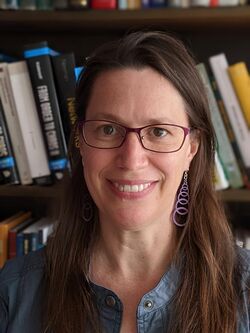Biography:Karen E. Daniels
Karen E. Daniels | |
|---|---|
 Daniels in May 2022 | |
| Nationality | American |
| Alma mater | |
| Known for | Advances in experimental probes of the structure and mechanics of granular materials. |
| Awards | |
| Scientific career | |
| Fields | Experimental Physics, Soft Matter, Granular Materials |
| Institutions | |
| Thesis | Pattern Formation and Dynamics in Inclined Layer Convection |
| Doctoral advisor | Eberhard Bodenschatz |
| Other academic advisors | Mary Hudson, Robert Behringer |
| Website | danielslab |
Karen E. Daniels is an American physicist who is a Professor of Physics at North Carolina State University. Her research considers the deformation and failure of materials. She is a Fellow of the American Physical Society, and serves on their Committee on the Status of Women in Physics. She is also a Fellow of the American Association for the Advancement of Science.
Early life and education
Daniels completed a bachelor's degree in physics at Dartmouth College in 1994.[1][2] She originally planned to study engineering.[3] After graduating, Daniels spent three years as a physics teacher at Saint Ann's School. Daniels joined Cornell University as a graduate student, earning a PhD in 2002.[1] She was a postdoctoral research associate at Duke University, working on jamming transitions.[1][4] At Duke University, Daniels developed a technique that can make a container of granules arrange into a solid-state crystal (freeze) or into a fluid (melt) by changing the rate at which they are shaken.[5]
Research and career
Daniels joined North Carolina State University as an Assistant Professor in 2005.[1] She is interested in how materials compress, stretch and bend when a force is applied.[6] She specializes in granular materials and their force chains, and how networks within granular materials control their bulk properties. She developed a way to monitor whether granular materials reach a thermodynamic equilibrium, using plastic granules.[7]
In 2011, Daniels spent a year as an Alexander von Humboldt Foundation fellow at the Max Planck Institute for Dynamics and Self-Organization in Göttingen,[1][8] coordinating a workshop on complex system's: "Particulate Matter: Does Dimensionality Matter."[9] She worked with Haverford College to study the naturally arising sound waves of granular materials.[10][11] When the materials experience shear stress, the vibrating grains start to stick to the interface. When the stress becomes too much, several grains slip at once, rearranging into new patterns.[12] The stick-slip transition is accompanied by low-frequency vibrational modes.[12] She demonstrated that sound passes through the areas of a material where particles are tightest together.[12] Her lab team have investigated how space missions could explore asteroids.[13] She was supported by NASA to conduct experiments in zero gravity, and took a group of undergraduates to Zero Gravity Corporation.[13] She has also looked at liquid metals, and demonstrated that applying a low voltage to eutectic gallium-indium can cause it to form snowflake-like crystals.[14]
Daniels is on the editorial board of Physical Review Letters.[1] [15]She serves on the American Physical Society Topical Group on Soft Matter committee.[16] Daniels has been involved with activities to increase the representation of women in physics since the start of her career.[17] She is part of the North Carolina State University NSF ADVANCE award "Developing Diverse Departments".[1][18]
Awards and honors
- 2007 National Science Foundation CAREER Award[19]
- 2011 Alexander von Humboldt Foundation Fellowship[20]
- 2013 North Carolina State University LeRoy and Elva Martin Award for Teaching Excellence[1]
- 2015 North Carolina State University Equity for Women Award[21]
- 2017 Physical Review Letters Outstanding Referee[22]
- 2018 Fellow of the American Physical Society[23]
- 2021 Fellow of the American Association for the Advancement of Science[24]
References
- ↑ 1.0 1.1 1.2 1.3 1.4 1.5 1.6 1.7 "Karen Daniels – Daniels Lab" (in en-US). https://danielslab.physics.ncsu.edu/people/karen-daniels/.
- ↑ "Alumni highlights: Karen Daniels '94 | Department of Physics and Astronomy". 22 May 2018. https://physics.dartmouth.edu/news/alumni-highlights-karen-daniels-94.
- ↑ Anonymous (2018-05-11). "Q&A: Looking for Failure" (in en). Physics 11: 47. doi:10.1103/Physics.11.47. Bibcode: 2018PhyOJ..11...47..
- ↑ "Physics - Karen Daniels". https://physics.aps.org/authors/karen_daniels.
- ↑ "Shake and Stir to Make Granular Materials Change Phases" (in en). https://today.duke.edu/2005/05/grainchange.html.
- ↑ Daniels, Karen (2014-11-03). "Viewpoint: Pushing on a Nonlinear Material" (in en). Physics 7. doi:10.1103/Physics.7.113. https://physics.aps.org/articles/v7/113.
- ↑ "Force is the key to granular state-shifting" (in en). http://www.eurekalert.org/pub_releases/2013-02/ncsu-fit021513.php.
- ↑ "Convection". http://www.ds.mpg.de/123831/convection.
- ↑ "NSF Award Search: Award#1019151 - Workshop Support for "Particulate Matter: Does Dimensionality Matter?"; Max Planck Institute for the Physics of Complex Systems; Dresden, Germany". https://www.nsf.gov/awardsearch/showAward?AWD_ID=1019151.
- ↑ "Researchers listen for failure in granular materials" (in en). https://www.sciencedaily.com/releases/2018/05/180529153058.htm.
- ↑ Brzinski, Theodore A.; Daniels, Karen E. (2018-05-25). "Sounds of Failure: Passive Acoustic Measurements of Excited Vibrational Modes". Physical Review Letters 120 (21): 218003. doi:10.1103/physrevlett.120.218003. ISSN 0031-9007. PMID 29883186. Bibcode: 2018PhRvL.120u8003B.
- ↑ 12.0 12.1 12.2 "Granular materials emit characteristic sounds before slipping" (in en-GB). 2018-06-12. https://physicsworld.com/a/granular-materials-emit-characteristic-sounds-before-slipping/.
- ↑ 13.0 13.1 "A Zero-Gravity Laboratory" (in en). 2019-02-13. https://sciences.ncsu.edu/news/a-zero-gravity-laboratory/.
- ↑ Scienmag (2017-10-30). "Voltage-driven liquid metal fractals" (in en-US). https://scienmag.com/voltage-driven-liquid-metal-fractals/.
- ↑ "PRL Editorial Team" (in en). 2022-09-20. https://journals.aps.org/prl/staff.
- ↑ "Committees" (in en). https://www.aps.org/units/gsoft/governance/committees/index.cfm.
- ↑ Zastavker, Yevgeniya V.; Williams, Elvira; Whitten, Barbara; Valentine, Jami; Rudati, Juana I.; Ong, Maria; Michelman-Ribeiro, Ariel; Martínez-Miranda, Luz J. et al. (2006-10-17). "Women in physics in the U.S.: A progress report". WOMEN IN PHYSICS: 2nd IUPAP International Conference on Women in Physics. 795. pp. 175–178. doi:10.1063/1.2128320. https://researchers.dellmed.utexas.edu/en/publications/women-in-physics-in-the-us-a-progress-report.
- ↑ "Advance at NC State – 2012" (in en-US). https://advance.wordpress.ncsu.edu/.
- ↑ "NSF Award Search: Award#0644743 - CAREER: State Variables in Granular Materials". https://www.nsf.gov/awardsearch/showAward?AWD_ID=0644743.
- ↑ says, Charles Fulp. "The Dirt Whisperer" (in en-US). https://news.ncsu.edu/2011/07/the-dirt-whisperer/.
- ↑ "Equity for Women Awards – Past Winners : Council on the Status of Women". https://cswomen.wordpress.ncsu.edu/equity-for-women-awards-past-winners/.
- ↑ "Physical Review Journals - Outstanding *Referees". https://journals.aps.org/OutstandingReferees.
- ↑ "APS Fellowship" (in en). https://www.aps.org/units/gsoft/fellowship/index.cfm.
- ↑ "2021 AAAS Fellows". https://www.aaas.org/page/2021-fellows.
External links
- Karen Daniels publications indexed by Google Scholar
